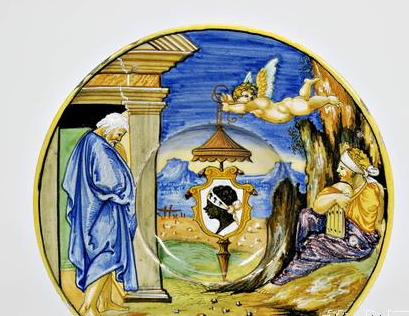The cruelty of love is a common theme
爱情中的残忍是一个常见的主题
I showed at the beginning of my talk a Faenza dish of a woman
在我刚开始讲一个有关一个女子用匕首
about to pierce her lovers heart with a dagger
刺穿她情人心脏的法恩扎瓷盘
This dish in the V and A
在维艾博物馆中的这个瓷盘
was painted much earlier in Deruta
是更为早期的时候在德鲁特进行彩绘的
around 1470-90
大概出产于1470到1490年间

At the centre
在瓷盘的中央
framed by gothic foliage
被哥特式树叶包围着的
is a young woman in court dress
是一个身穿宫廷礼服的年轻女子
she draws her bow to aim an arrow at a young man
她拉起他的弓箭
bound naked to a column
对准一个赤裸着绑在石柱上的年轻男子
This figure is copied from an earlier type of engraving
这个人物是模仿一种早期的版画而来的
illustrating Petrarch's triumph for fame
描绘的是彼特拉克功成名就的画面
while the float upon which they stand
他们站着的彩车
recalls the imagery of Petrarch's triumphs
让人想起了彼特拉克胜利的画面
which was closely associated with wedding feasts
这个和婚宴以及意大利文艺复兴时期的
and spectacle in Renaissance Italy
热闹场面息息相关
The two figures flank a standing cup
这两个人物旁边立着一个高脚杯
"which is a heart and pierced by two arrows
里面是一颗被两支箭刺穿的心脏
inscribed by in a scroll
年轻男子的头周围飞舞着一个卷轴
that flutters around the young man's
上面的题字是
head it says "oh what a cruel fate"
"噢 命运多么残酷"
The way in which the young woman
而年轻女子则被描绘成一名弓箭手
is portrayed as an archer as she unleashes arrows into
正放箭刺穿她深爱之人的心脏
the heart of her beloved inflicting pain and inflaming desire
所带来的痛苦和激起的欲望
is a literary conceit
是一种文学构想
The theme is elaborated on a second dish from Deruta
这个主题在德鲁特的第二只瓷盘
also in the V and A
得到了细致的体现 同在维艾博物馆
here a woman wears court dress of the late 15th century
这里 一名女子穿着15世纪末的宫廷礼服
she holds a trophy, a cup containing a heart
她手持着战利品 也就是盛放着被两支箭
pierced by two arrows surmounted by a crown
刺穿心脏的杯子 上面还放着一个皇冠
She is accompanied by an inscription
她的旁边有一行文字
"my heart is wounded by you"
"我的心被你伤害过"
the words are intended to be those of the male lover
这些字眼应该是男方所说的
whose heart has been pierced by the woman's glances
他的心脏被女子犹如利箭般的
as if by arrows
眼神所戳伤
He dresses his lady as presented on the dish
瓷盘上描绘的是他为他的妻子更衣
The idea that the woman's gaze wounds the heart of the lover
这个女子的眼神灼伤爱人心脏的构想
has a very long history
早就有了
In the Biblical Song of Songs, the poet dresses his lover
在《圣经雅歌》中,诗人为其爱人更衣
"thou hast ravished my heart my spouse
"你让我着迷 我的爱人
thou hast ravished mine heart with one of thine eyes"
你用一只眼睛就可以迷惑我"
The conceit expressed here is a literary one
这里所表达的这种构想是一种文学构想
echoing late medieval love poetry in the vernacular
和中世纪用方言写成的情诗相互呼应
such as the poem by Dante Allegory
如阿利盖利·但丁的诗歌
in which the poet promises
诗人发誓要为自己报仇
to avenge himself on the stony heart of the woman
报复那个用眼神刺穿其心脏的
who has pierced him to the heart with her glance
铁石心肠的女人
He writes "to such a woman
他这样写道 "对于这样的女人
my song goes straight to her who wounded me
我的歌直接献给那个伤害我
and still conceals what I most hunger for her heart
但仍隐藏了我最渴望得到她的心的心情
with a fast arrow cleave
最终他的心被箭深深刺穿"
for in revenge, great honour we achieve"
在复仇中 我们获得了莫大的荣誉












